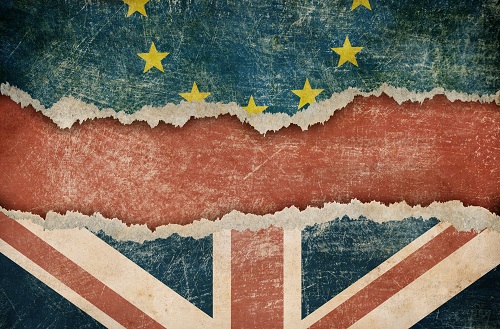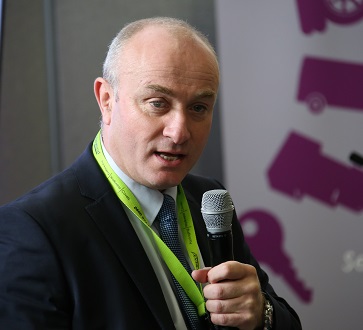One of the best attended talks at The Movers and Storers Show Seminar Theatre last November was given by James Backhouse of Backhouse Jones Solicitors who explored what the consequences of Brexit might mean for businesses.

James began by asking the audience when and why the EU was formed. There were no takers. James explained that the EU came into being in an effort to stop the countries of Europe fighting in the aftermath of the Second World War. “There have been wars in Europe for over 400 years and two world wars during the twentieth century in which millions of people, not just from Europe, were killed,” he said.
The EU was an attempt to bring countries together by simplifying trade and encouraging friendship among the Member States. The Eurovision Song Contest was another initiative aimed at breaking down barriers and encouraging cultural accord. There were other treaties and agreements struck in the decades since the war, intended to bring countries in Europe closer together.
James explained that money was often a root cause of conflicts between countries and that gradually bringing the prosperity of European states up to a similar level would result in a more harmonious relationship.
By voting for Brexit the United Kingdom had voted to withdraw from those trade and cultural agreements and the government and the people of the UK must now decide what happens next. It is important to recognise that leaving the EU does not mean leaving all the non-EU treaties that the UK has entered into with the other European countries, for example we will still be part of the European Convention on Human Rights.
James said that so far the prime minister had kept her cards very close to her chest and had not revealed what the government’s aims and objectives were, but that was to be expected and was a normal strategy in any negotiation in the early stages.
“David Davies has been given the job of negotiating with the EU and getting the best deal after Article 50 is triggered, while Liam Fox will be talking to the rest of the world trying to secure trade agreements with them,” said James. “The EU is likely to drive a hard bargain – otherwise it would encourage others to leave – and it will be Liam Fox’s role to strike deals with countries outside the EU to at least replace the trade we may lose by exiting Europe.”
James pointed out that the UK is the world’s 5th largest economy and one of the biggest in Europe and that any major damage to the UK’s fortunes would have a profound effect on the rest of Europe’s economy, so they don’t want us to fail.
The UK will leave the EU in two to three years’ time, just before the next general election in 2020. “Historically general elections are won by the party that convinces the country they have control of the economy, even though in the referendum the priority for many was immigration,” said James. “Having the best possible access to the single market is important to the success of the UK’s economy with approaching 50% of our exports going to Europe, and in my opinion, at least, Theresa May will be determined to make sure that is achieved on the run-up to the election even if it means other sacrifices from the ideal Brexit that some were seeking. That pro single market access would, of course, be good for many businesses in the UK and the remaining countries of the EU.”
Those in our industry hoping for changes to transport regulations however are likely to be disappointed, at least in the short term. When Brexit happens almost all European regulations, including those governing things like Operator Licences, CPC, drivers’ hours, tachographs, etc., will be adopted by the UK. Over the coming decades the government will approach and possibly change some of them as they see fit, but over the next few years, little will change. James urged removals companies to keep their trade associations informed of any potential difficulties they foresee operating in Europe so they can keep pressure on the negotiators - who James said are likely to be relatively ignorant about practical road transport matters - to make sure transport policy is recognised as a priority. Always remembering that economic aspects of any concerns you have are the politicians’ main focus.
No one can predict what will happen in the years following Brexit, but James advised business people to look carefully at any contacts they have which are EU sourced and make contingency plans to protect their businesses should they be curtailed in the future. He said it’s also important to keep informed about what’s going on and to keep pressure on the government, through the trade associations, to recognise how important the transport industry is to the economy of the country.
His main thrust was that if transport companies do nothing or simply complain individually without putting forward a strong economic argument, their voice is unlikely to be heard.
www.backhousejones.co.uk
 James qualified as a solicitor in 1992 and began specialising in road transport law in 1994 when he joined the family practice which has specialised in transport law since 1930. When not defending operators, James enjoys sailing with his family.
James qualified as a solicitor in 1992 and began specialising in road transport law in 1994 when he joined the family practice which has specialised in transport law since 1930. When not defending operators, James enjoys sailing with his family.
Click here to see the next Editor's Pick